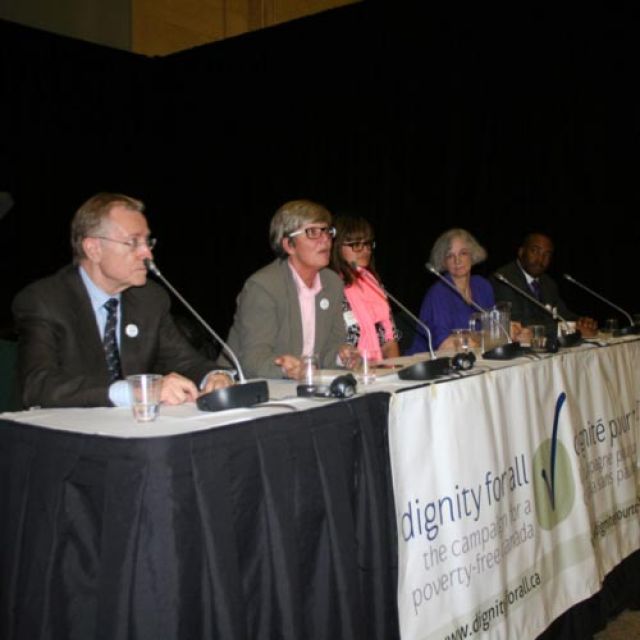OTTAWA - Ottawa’s All-Party Anti-Poverty Caucus continues to search for nonpartisan solutions to poverty — but it won’t be easy.
The caucus marked International Day for the Eradication of Poverty Oct. 17 with a panel discussion entitled “Ending Poverty Together: Real Stories, Real Solutions.” It brought together NDP, Liberal and Conservative MPs and Senators, representatives from anti-poverty groups, and two panelists who shared their lived experience of poverty.
“We’re good at raising awareness,” said NDP human resources critic Chris Charlton, caucus co-chair. “We’re not so good at moving the yard sticks.
“Government programs can make a difference if we design them right.”
Though Charlton would like to see greater tax fairness, she acknowledged higher taxes were not likely to find all-party support. She praised a Tory program, however, that helps the working poor rise out of poverty as one example of a program all parties support.
Caucus co-chair Liberal Senator Art Eggleton decried the fact one in 10 Canadians live in poverty and one out of four are children. Poverty costs Canada about $30 billion, according to a recent study, he said, with health care costs alone consuming about $7.5 billion.
“The social welfare system treats the symptoms, but leaves the disease untouched,” he said.
It is less expensive to give someone a home and support services than to leave him or her on the street, he said, because street people drive up hospital costs through use of emergency rooms.
They can also end up costing the justice system money.
“We know the facts; we know the answers,” said Eggleton, the former Toronto mayor and Liberal cabinet minister.
“Why isn’t something happening?”
It is a matter of political will, he said, noting the caucus is trying to build it.
Eggleton also raised concerns about growing income inequality that is affecting not only the poor but also the middle class, calling the gap a threat to Canada’s social cohesion.
Conservative Senator Don Meredith, who is caucus treasurer, said he grew up poor in Jamaica, arriving in Canada at the age of 12. He lived with his family in social housing in the tough Jane-Finch area of Toronto. He credited his family, religious faith and hard work in “overcoming adversity and finding success.”
“This is not about partisan lines,” he said. “It is about the lives of Canadians.”
He stressed entrepreneurship, job creation and reaching at-risk youth.
Geraldine King, a young First Nations woman, said intergenerational poverty had become normalized to the extent she did not realize she was poor until peers started making fun of her when she reached age seven or eight. She thought going to food banks and wearing second hand clothes from a bin was something everyone did.
King credited a federal program with helping her get out of poverty. A new employment insurance (EI) rule allowed her to resign from her lower paying job to seek more training by attending university while still receiving EI benefits. This program helped her survive her first year in university. After that she qualified for bursaries and scholarships.
King said she was lucky to find out about the program because systemic barriers keep people like herself from finding out about them, especially those without computer access or living in First Nations communities.
Linda LeBlanc, an anti-poverty advocate who raised two children on and off social assistance, depending on her health or employment status, spoke of the isolation and marginalization she experienced.
Many poor people cannot leave their homes for lack of money and transportation, disability issues or pregnancy or small children, she said. Being poor means constantly juggling, never knowing what is going to come at you, just struggling to get through the day.
Though many say the best social program is a job, without supports like housing, child care and transportation the job will not do much good, she said.
Then there are many who can’t take a job even if the supports are in place.
LeBlanc said the best consultants on poverty are those who have lived it, but they often cannot find the money to attend meetings like this.


